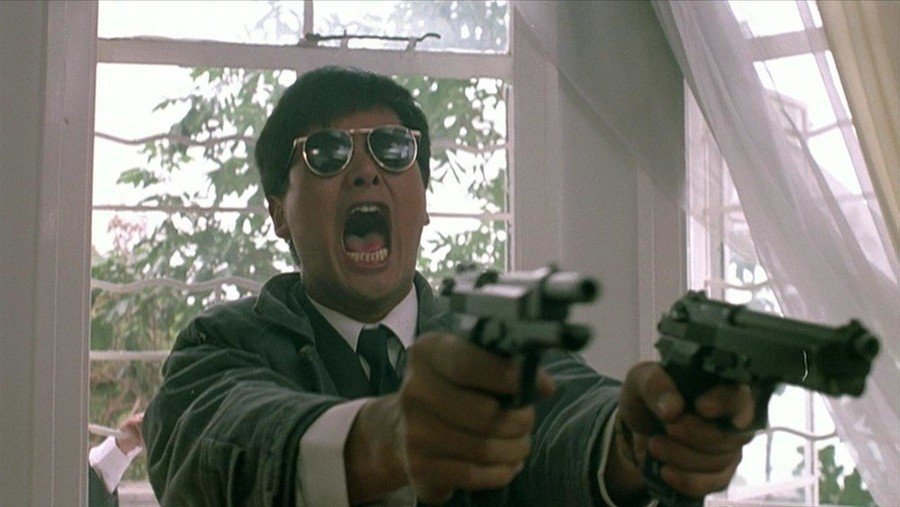Archiwum - 9. Festiwal Filmowy Pięć Smaków
Lepsze jutro II
Opis filmu
Po oszałamiającym sukcesie "Lepszego jutra" decyzja o stworzeniu kontynuacji była oczywista i błyskawiczna – w kinie komercyjnym rzadko porzuca się sprawdzone pomysły. Do pracy ruszyła ta sama ekipa, aby raz jeszcze opowiedzieć o honorowych i romantycznych bohaterach, walczących o sprawiedliwość w mrocznych zaułkach betonowego Hongkongu. Chow Yun-fat jest tu już wielką gwiazdą, ogrywa to z dużym dystansem i poczuciem humoru, komentując nawet modę, którą zapoczątkował wśród młodych Azjatów po premierze pierwszej części.
Chociaż nie brakuje w "Lepszym jutrze II" scen skrajnie dramatycznych, film ma zdecydowanie lżejszy nastrój niż pierwowzór, więcej tu autoironii i mrugnięć okiem. Fabuła jest bardziej pretekstowa i miejscami schodzi na drugi plan – liczy się przede wszystkim akcja. Sekwencje strzelanin, a zwłaszcza finałowa potyczka, podczas której luksusowa willa przestępczego bossa zamienia się w spływającą krwią ruinę, należą dzisiaj do ścisłego kanonu. Część z nich pieczołowicie odtworzyli Wachowscy w pierwszym "Matriksie", dobitnie wskazując, komu współczesne kino akcji zawdzięcza swoją widowiskowość i dynamikę.
Już podczas prac nad "Lepszym jutrem" Woo zaczął realizować pomysły, które tu znalazły pełne rozwinięcie, i które sprawiły, że stał się stylistą klasy Sama Peckinpaha czy Sergio Leone. Wśród nich znalazło się budowanie rzeczywistości w oparciu o intensywny montaż (David Borwell nazywa go konstruktywnym) oraz obfite wykorzystanie zwolnionych ujęć i ekstremalnych zbliżeń.
John Woo lubi powtarzać, że broń palna nie różni się dla niego od miecza. Widać to doskonale w scenach w których Ho (przypomnijmy – Ti Lung był gwiazdą filmów wuxia) chwyta za białą broń, stając się równorzędnym przeciwnikiem dla licznych oprychów z pistoletami.
Marcin Krasnowolski
John Woo
Urodzony w 1946 roku w południowych Chinach, wychowywał się w Hongkongu. Karierę zaczynał jako asystent reżysera w legendarnym Shaw Brothers Studio (pomagał m.in. Changowi Chehowi, legendzie kina wuxia). Zadebiutował w roku 1973, ale przełomem okazało się dopiero "Lepsze jutro" z 1986 roku, zrealizowane przy współpracy z Tsuiem Harkiem. Kolejne hongkońskie filmy Woo potwierdziły jego reputację mistrza sekwencji akcji – eksperymenty z montażem i brawura z jaką łączył konwencje gatunkowe zachodniego kina z filozofią kina Wschodu wydatnie przyczyniły się do rozwoju współczesnego języka filmowego. Po roku 1992 Woo wyjechał do Hollywoodu, gdzie odniósł spore sukcesy, m. in. za sprawą "Bez twarzy" i drugiej części serii "Mission Impossible". Zdecydował się wrócić do Chin, gdy ta rosnąca w siłę kinematografia stworzyła mu możliwość realizacji wysokobudżetowych filmów. Jego najnowszym dziełem jest dwuczęściowe "The Crossing", nazwane chińskim "Titanikiem".
1986 Lepsze jutro / Better Tomorrow
1987 Lepsze jutro 2 / Better Tomorrow II
1989 Killer
1990 Kula w łeb / Bullet in the Head
1991 Był sobie złodziej / Once a Thief
1992 Hard Boiled. Dzieci Triady / Hard Boiled
1997 Bez twarzy / Face/Off
2000 Mission: Impossible 2 / Mission: Impossible II
2015 The Crossing





